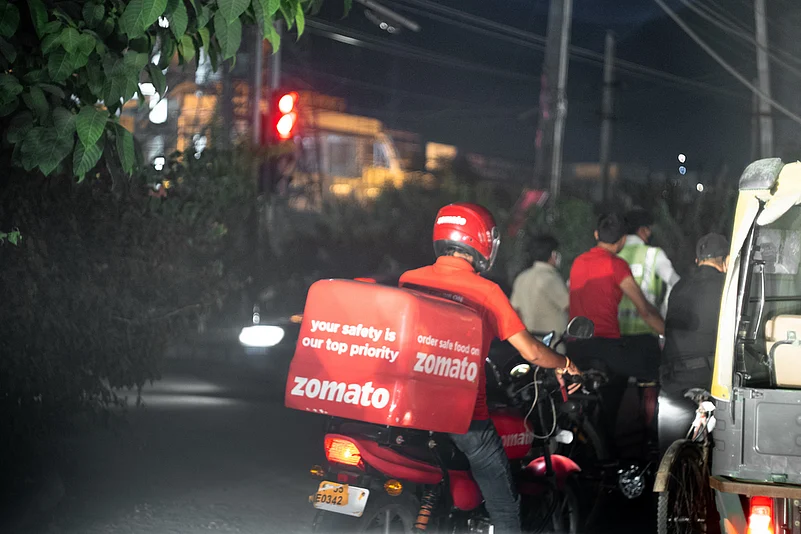Food delivery platform Zomato recently received a GST notice of Rs 803 crore by the Joint Commissioner of CGST & Central Excise. The company informed the exchanges about the same on December 12.
The demand notice comprises GST of Rs 401.7 crore with interest as applicable and a penalty of Rs 401.7 crore. The notice was received by the company with regards to non-payment of GST on delivery charges with interest and penalty.
The food delivery giant has informed the exchanges that they will file an appeal against the appropriate order. “We believe that we have a strong case on the merits, which is backed by opinions from our external legal and tax advisors,” the company said.
In December 2023 also, Zomato received a Rs 402 crore show cause notice from the GST department. This again was related to the non-payment of taxes for the delivery fee. The notice was issued from a period of October 29, 2019, to March 31, 2022.
However, the food delivery giant at that time mentioned that they are not eligible to pay taxes on delivery fees, as the same are collected on behalf of its delivery partners. The company added, “Delivery partners have provided the delivery services to the customers and not the company.”
Some experts have opined that the argument by the food delivery giants holds some ground as the gig workers are technically the service providers. “However, since platforms collect and process this fee, tax authorities consider them the suppliers of the service, making them liable for GST,” said Prateek Bansal, Partner—Taxation, White & Brief—Advocates & Solicitors.
In November 2023, Zomato and Swiggy also received fresh notices of Rs 750 crore for non-payment of delivery charges. Speaking about the same at that time, a Swiggy spokesperson told IANS, “There has been no significant change in platform fees, which are applied by most service players and are a common practice across most industries.”
Soon after this, an Economic Times report released in November last year mentioned that both Zomato and Swiggy wanted to approach the GST authorities to explain their stance. Speaking about the same, a source told the Times that the platforms are “engaging with lawyers and tax consultants to provide clarity to the authorities that the delivery fees are not accounted for as revenue but passed on to delivery workers.”
Now, if we look at the legal aspect of it, under GST law, food delivery is classified as a taxable service subject to 18 percent GST.
“The government maintains that platforms like Zomato and Swiggy, which collect delivery fees and facilitate services, must pay GST on these fees. From the authorities' perspective, the service of delivery is an integral part of the platform’s offering, and the platform acts as the supplier of this service, making them liable to collect and remit the tax,” added Bansal.
Some experts have indicated that when a customer places an order through Zomato, they purchase a bundle of services, including the food from the restaurant and the delivery service. Treating the delivery charge separately doesn’t seem appropriate because it's part of the bundled service, add experts.
“The reason being, there is already a tax collected at source (TCS) under GST, which is paid on the full transaction value by platforms like Zomato and Swiggy. This includes both the restaurant’s share and Zomato’s platform fee,” said Manohar Samal, Principal Associate, Ratan Samal & Associates.
Legal Loophole: Determining the Service Provider
This ongoing issue brings the January 2022 guidelines of the government into notice. Just to give some context, the guidelines indicated that food delivery platforms would be responsible for collecting GST from restaurants on sales made through their services. They would also be responsible for depositing GST. Prior to this, restaurants used to collect and deposit GST.
Speaking to media about the same, Finance Minister Nirmala Sitharaman, said in September 2021, “The place where food is delivered is going to be the point where tax will be collected. They will pay the GST on it.”
These guidelines were taken after Revenue Secretary Tarun Bajaj highlighted that several restaurants were not paying taxes, and they would be unavailable after some time.
Speaking about the guidelines, Samal highlighted that they were issued to clarify how taxes should be applied to cloud kitchens and e-commerce aggregators, especially in cases where these platforms are connecting customers with restaurants.
However, the issue of taxing separate components of a transaction repeatedly has not yet been fully clarified, added Samal.
So, now how to deal with the legal loophole that is existing? Experts highlight that the legal loophole lies in determining the "service provider" for GST purposes—whether it should be the gig worker or the aggregator.
From the government’s point of view, Bansal highlighted that platforms like Zomato are treated as "deemed suppliers" and are obligated to pay 18 percent GST on the delivery fees collected from customers.
Some believe that the government should treat the entire transaction as a composite supply. “Without the delivery, the transaction is incomplete. Therefore, the entire transaction should be treated as one, and tax should only be collected once on that transaction,” added Samal.
Others have highlighted that clearer guidelines are needed from the government to address this issue. “To address the issue, the government may issue further clarifications, specifically outlining the taxability of services provided through e-commerce platforms, which would provide much-needed clarity for both the platforms and the delivery workers,” said Darshan Bora, partner at Economic Laws Practice. The 55th GST Council is all set to meet on December 21 this year. It will be interesting to note if the council makes any announcement on the same.
































